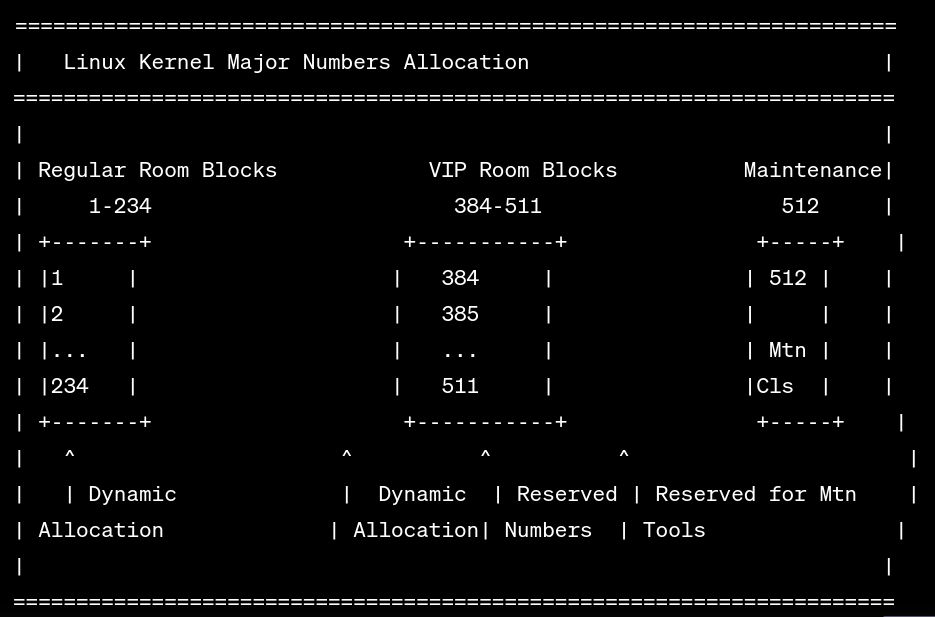
Hey there, tech enthusiast! If you’re like me, you get a kick out of demystifying the black box we call the Linux Kernel. Today, we’re diving into the sea of major and minor numbers, with a spotlight on dynamic allocation. Fasten your seatbelts, and let’s ride the Kernel coaster! 🎢
Kernel’s Secret Address Book: Major & Minor Numbers 📔
First off, a brief detour for our newcomers. Devices in Linux are represented by files, and each of these files (devices) is identified by a combination of major and minor numbers. If the Kernel was a postman, these numbers would be the addresses he uses to deliver data packets!
But here’s the twist: Instead of having fixed addresses (major numbers), what if we want the Kernel’s postman to dynamically pick an address for us? Enter alloc_chrdev_region.
Dynamic Allocation with alloc_chrdev_region 🪄
This function is like the Kernel’s magical sorting hat. It assigns a major number dynamically! If you’re tired of sticking with fixed major and minor numbers, this function is your best friend. From our class notes:
int alloc_chrdev_region(dev_t *dev, unsigned baseminor, unsigned count, const char *name);But let’s spice things up with an analogy!
Major Numbers and the Grand Linux Hotel 🏨
Alright, picture this: a bustling hotel with 512 rooms, known as the Grand Linux Hotel. This hotel isn’t just for guests looking for a cozy bed; it’s for devices searching for their own unique identifier – their room number.
Hotel’s Breakdown:
Total Rooms (CHRDEV_MAJOR_MAX): 512 rooms – from the ground floor to the penthouse.
Regular Rooms (1 to CHRDEV_MAJOR_DYN_END): The first 234 rooms are the standard suites. They offer a great view and are the first to be snapped up by eager devices.
VIP Suites (CHRDEV_MAJOR_DYN_EXT_END to CHRDEV_MAJOR_DYN_EXT_START): Room numbers from 384 to 511 are the luxurious VIP suites. Only the creme-de-la-creme of devices get to stay here, and only when the standard suites are all taken.
Maintenance Closet (512): Room 512 is more of a utility closet. It’s reserved for those special Kernel maintenance tools and isn’t available for the usual devices.
Booking Query: Available Rooms?
Considering the Regular and VIP suites, we have:
- Regular rooms: 234
- VIP suites: 128 (from 511 – 384 + 1)
Total available for booking: 362 rooms!
That’s right! Out of the 512 rooms in our Grand Linux Hotel, only 362 are available for our device guests. The others? Well, they’re either already occupied or reserved for special occasions.
Let’s Get Our Hands Dirty with Some Code! 🛠️
Roll up your sleeves, because this is where things get wild. Here’s a sample Kernel module I came across:
//... [code header]
// Declaration of module parameters with default values.
int base_minor = 0; // Starting minor number for device
//... [other variable declarations]
// Initialization function for the module.
static int test_hello_init(void)
{
int i = 0;
//... [print the module parameters]
// Loop to try registering the device 512 times.
for (i = 0; i < 512; i++) {
// Attempt to allocate a character device region.
// ... [rest of the loop]
}
return 0;
}
//... [module exit function
Notice the loop? It’s like knocking on the Kernel’s door 512 times, asking, “Hey, got a major number for me?” And with a sprinkle of patience (msleep(1000)) between each knock!
Kernel’s Response: Yay or Nay? 🚦
Our persistent module, during its 512 knocks, might get one of the two responses:
- Yay! The Kernel assigns a major number and our module dances with joy.
- Nay. The Kernel goes, “Sorry, no numbers for you!” Maybe because we’re out of the range or have simply exhausted available major numbers.
Parting Words 🌟
Understanding the Linux Kernel’s system of major and minor numbers is akin to unraveling the booking system of our fictional Grand Linux Hotel. Both are filled with intricacies, rules, and exceptions, but once you get the hang of it, it’s smooth sailing—or should I say, booking?
Stay curious, keep coding, and remember: every device deserves its own room in the Grand Linux Hotel of Linux Kernel!
Happy Kernels to you! 🐧🏨🔑
